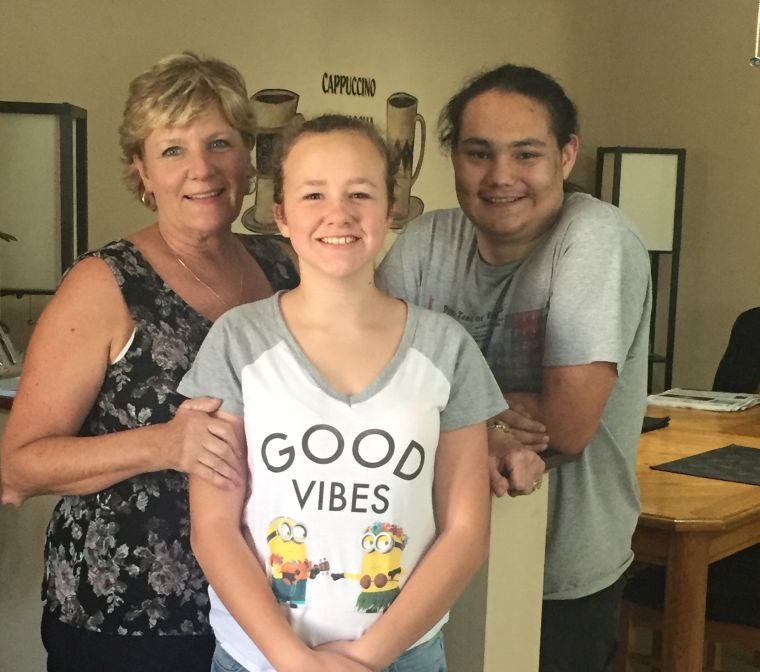Brenda Boylan has two children with Fetal Alcohol Spectrum Disorder — a condition that’s more common that you may think.

It affects up to five per cent of the population, according to the Canada FASD research network.
“There are more children born with FASD than autism, Down syndrome, spina bifida, and HIV combined,” the group’s executive director, Audrey Mcfarlane, said on Friday, which is International FASD Awareness Day.
Yet despite its prevalence, Boylan feels not enough is known about it.
Even though she’s had her two adopted children — 18-year-old Isaiah and 14-year-old Ireland — since they were born, they weren’t diagnosed with FASD until they were eight and 11. Some people are adults by the time they’re properly diagnosed.
“A lot of kids often fall through the cracks,” said the 57-year-old Ontario mother-of-three.
The condition can lead to all sorts of behavioural problems including an ADHD that won’t improve like non-FASD-related cases. Maintaining relationships and employment can also be potential side effects, along with memory problems. People with FASD are also more likely to end up in prison.
READ MORE: Canadian study finds over 400 new reasons not to drink while pregnant
Boylan doesn’t know how much her kids’ biological mothers drank. But her first clue something was off was when Isaiah and Ireland suddenly became “very hyper” at age three. She just couldn’t get them to listen and the standard discipline advice in parent books wouldn’t work.
School only exacerbated the problem. The kids would blurt out answers and forget to raise their hands. They’d also struggle with communication and concentration. Eventually their teachers asked for their sight and hearing to be tested.

Get weekly health news
When the results came back with what Boylan had already suspected, she found it tough to get support at the school level.
She said teachers would often get frustrated at the two, and failed to understand their limitations.
“Teachers have been tough on them… They are shunned a lot by their peers,” she said. “Their life is tough. They have permanent brain damage [and are] so misunderstood.”
WATCH: More about FASD
Her son has given speeches to shed light on his condition. He also graduated high school this past June — a feat Boylan credits to his school’s inclusion coordinator who works with all kinds of special needs kids.
The thing that made a big difference, in Boylan’s eyes, is the support worker who took the time to learn about Isaiah and his FASD. She then figured out how to tackle academic challenges together.
While post-secondary education might not be an option for him, Boylan hopes to help land her son some kind of welding job with an employer who can accept his weaknesses.
She stresses there needs to be more empathy and assistance in the community for those who suffer from FASD. Because until now, her biggest source of support has been other parents raising kids with the condition.
Mcfarlane admits diagnostic services are “sporadic” across the country but insists Canada is a leader in researching FASD.
The latest study that’s still being completed suggests as people with FASD grow older, they can have significant health problems. Their rates of certain diseases like cancer appear to be more elevated and occur sooner than in the rest of the population.
Although the results are still preliminary, they add to a whole host of evidence on the long-term consequences of drinking while pregnant.
Is any alcohol safe during pregnancy?
The medical community hasn’t been able to find a “safe” level of alcohol during pregnancy. Since every woman is different, her ability to metabolize alcohol will vary based on a number of factors such as nutrition, body chemistry and weight.
So a glass of wine may not have an impact for one woman, but it could for another. That’s why the recommendation is to abstain from all alcohol when expecting or trying to get pregnant.
The time between conception and when women usually find out they’re pregnant can be one of the “most critical,” Mcfarlane said, when it comes to a baby’s “brain hard-wiring.”
“[Parents] may not see the results in their beautiful baby when it’s born,” she said, “but over time there may be challenges that are unexplained.”
“Why take that chance?” Boylan added. “It’s not fair for the kids, and ultimately it won’t be fair to the parents either.”









Comments